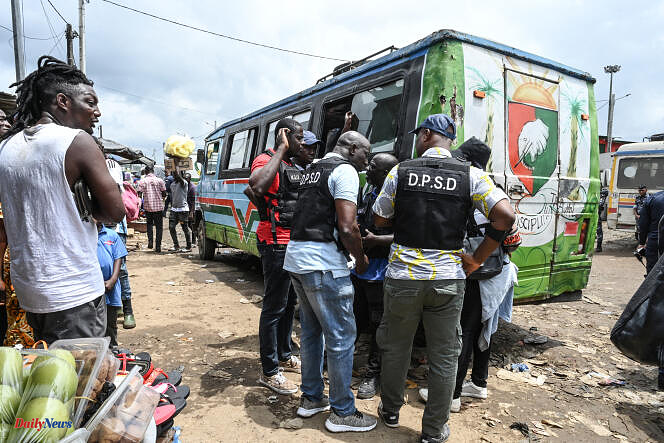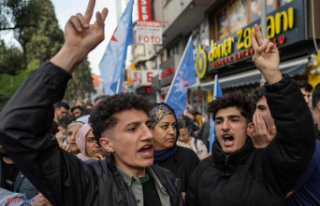He is the real star of the trial which has monopolized the economic and financial penal center of Abidjan for almost two months. Tried for international cocaine trafficking and criminal association after the seizure of more than two tons of white powder in San Pedro and Abidjan, in April 2022, Miguel Angel Devesa Mera continued to surprise the audience with his relaxation, his cheekiness and his gift for punchlines.
While almost all of his eighteen co-defendants have pleaded not guilty, the former Spanish police officer converted to drug trafficking plays – perhaps overplays – the frankness. “I will explain to you…”, he says every Thursday, since February 8, in fumbling French before exposing his accomplices, exonerating the others and dismantling screw by screw, in court, the system he has patiently built.
First, he explained, several types of drugs were sold in Ivory Coast. “To avoid flooding the market with too much high-quality cocaine, I preferred to diversify the offer with cut cocaine,” explains Mr. Devesa Mera. Low-end powder was therefore imported from Ghana from 2018 and Ghanaian and Nigerian specialists were recruited to cut it in a small laboratory installed in the house of Koumassi, a commune in Abidjan. Packaged, the drugs were stamped with a Mercedes logo.
But it's not this cheap cocaine that was seized in San Pedro in April 2022. Miguel Angel Devesa Mera, who says he has close ties to a Colombian cartel, claimed that this "97% pure" variety came from Paraguay and that it was intended for large buyers from the entire sub-region. “Nigerians, Beninese, Senegalese,” he listed. But especially Ghanaians. » The goods, once delivered, were to be resold in West Africa or exported to Europe.
Under the noses of the authorities
At the time of his arrest, Miguel Angel Devesa Mera had received 60 million CFA francs for his first transactions. The expected gains after complete sale of the goods should have amounted to 41.1 billion CFA francs (some 62.6 million euros), according to estimates by the Ivorian justice system. Considerable sums, which allowed the drug trafficker to finance a systematic and massive use of corruption.
Because this vast trafficking took place under the noses of the authorities. “It’s very easy to bring all these people into the police and the army,” said Miguel Devesa, during the hearing of the former commissioner of the criminal police of San Pedro, Karamoko Dosso, in February. They lack training, they lack resources…” The Spanish drug trafficker detailed his method of seduction, winning “little by little the favors” of his targets by identifying their weak points.
Commissioner Dosso, for example, needed solar batteries and a generator for the school he was building. As for Guy Serge Leila Kouassi, the former commander of the San Pedro naval base, he was, according to Mr. Devesa Mera, a great fan of nightclubs and female company, and sought to finance “his restless nightlife.”
“Once I see that they are permeable, that they accept money and gifts, I ask a little more,” revealed Miguel Angel Devesa Mera. He himself distiled the information drop by drop, presenting himself first as a simple businessman thanks to his shell company, Kibor Africa, before evoking "smuggling" activities then, once the target sufficiently shod, drug trafficking. To secure communications, Commissioner Dosso was tasked with purchasing “small phones for 10,000 CFA francs,” devices without an Internet connection called “bigo” by dealers in France.
A ton of cocaine lost?
Thanks to these methods, Miguel Devesa managed to set up a solid network of complicity in various trades. According to him, César Ouattara, an elected official from the San Pedro regional council, had thus become his right-hand man in the city. Commander Leila Kouassi kept the Ivorian navy away from the port when the goods were unloaded there and had to warn in the event of a stopover by the French navy.
As for Commissioner Dosso, his attendance initially allowed Miguel Devesa to extract information on the functioning and organization of the San Pedro police, and to ensure that neither Spanish justice nor international justice sought to find it. Secondly, it was he who provided a police escort to the drug trafficker to transport the cocaine by road from San Pedro to Abidjan without being disturbed at police checkpoints.
But the gray areas that remain are numerous, the story of Miguel Angel Devesa Mera being sometimes elliptical. “I don’t have the life of a Yango driver [Russian VTC application widely used in Abidjan], he joked in court when the prosecutor was annoyed by some inaccuracies in his story. I'm very busy, you know, it's hard to remember all these dates. I meet at least three or four people a day, police officers, politicians, Colombians, Venezuelans... My life is very hectic, I make a lot of money but I don't have time to enjoy it. It’s like Netflix! »
The main unknown in the case concerns the extent of this network of complicity. Who are “the politicians” that Miguel Devesa spoke of, when only César Ouattara can be considered as such in the dock? The ease with which the Spanish drug trafficker was able to settle in Ivory Coast in 2018, under his real identity, when he had spent eighteen months in prison in Mali for cocaine trafficking and murder, before being relaxed, remains unexplained for the moment.
What was the intended method of laundering trafficking proceeds? Miguel Angel Devesa Mera denied having done business with the companies 911 Sécurité and Pasta e Pizza. What, finally, was the actual amount of cocaine seized? Ivorian justice declared two tonnes, while Miguel Angel Devesa Mera claims to have received three tonnes. A ton of cocaine would therefore have been lost somewhere between San Pedro and Abidjan.












